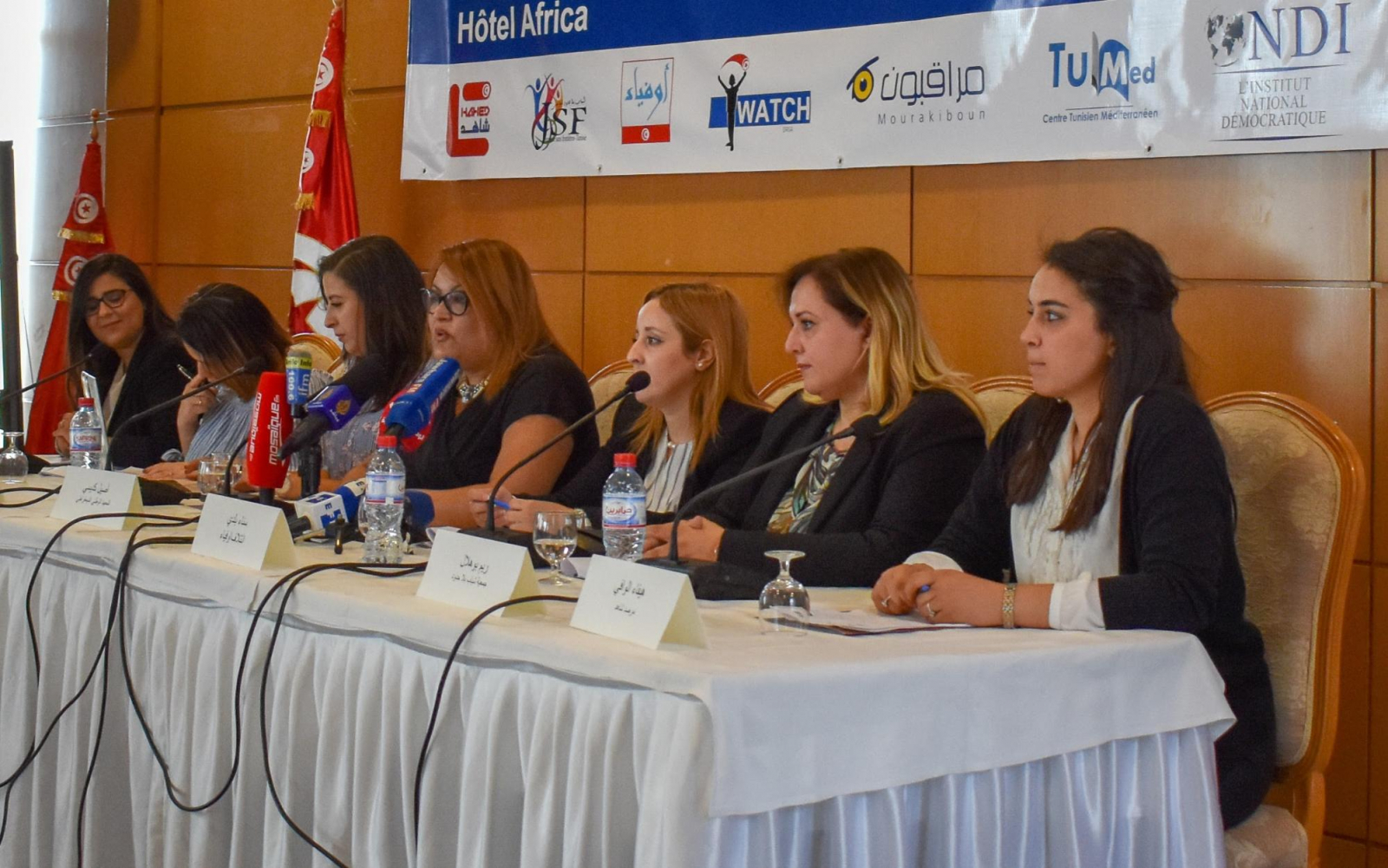
Representatives from six Tunisian election observation groups deliver findings and recommendations following the May 6, 2018, municipal elections.
SHARE
Since the 2011 uprising, Tunisians have demanded the integrity of elections as a reform measure to combat a long history of corruption and lack of transparency. To that end, Tunisian civil society has deployed tens of thousands of citizen election observers over the past eight years and spanning four electoral cycles. As Tunisia gears up for legislative and presidential elections this fall, a group of citizen observer groups is taking unprecedented collaborative steps to ensure a fair and transparent electoral process.
While most observation groups tend to act independently, six NDI-supported organizations began working collaboratively in 2018 to observe Tunisia’s first-ever municipal elections under its new constitution. Drawing on their experiences from the 2011 and 2014 elections, these organizations aspired to a more coordinated observation effort which would result in wider coverage of each stage of the electoral process.
With guidance from NDI, the six observation groups — the Chahed Observatory, IWatch, Mourakiboun, the Ofiya Coalition, the Tunisian Mediterranean Center (TU-MED) and Youth Without Borders (French acronym JSF) — referred to hereafter as “the collaborative group,” divided their coverage of the municipal elections. Each organization focused on one or more aspects of the electoral process, from voter and candidate registration, via media monitoring and gender aspects, to observation on election day itself. “Exchanging opinions and advice within the collaborative group allowed us to strengthen our efforts,” said an advocacy specialist from IWatch. Each collaborative group member employed its unique strengths and capabilities thereby increasing the collective impact of their observation efforts.
“Being a member of the collaborative group allowed our organization to focus on observing gender as a specific component of the electoral process,” said the executive director with TU-MED.
“Working in the collaborative group pushed us to specialize in media monitoring, allowing us to earn recognition from the ISIE (the High Independent Authority for Elections) and HAICA as specialists in the field,” said a leader within Ofiya which contributed its expertise in media monitoring.
Collectively, these organizations fielded more than 3,500 observers across the country’s 24 governorates and 350 municipalities. More than half of the observers were women and three-quarters were 35 years old or younger. Thanks to their coordination, the groups were able to observe each phase of the electoral process from the launch of the voter registration in July 2017 through electoral disputes in June 2018. The groups also collaborated to communicate their findings, chairing a joint press conference in the week following election day.
“Since we observe together and deliver findings collaboratively, our recommendations become stronger and more effective,” said a project manager with JSF.
In January, the collaborative group issued 22 joint recommendations for improving the quality and integrity of the 2019 elections based on their observations of previous election cycles. The recommendations address themes such as: improving election administration, strengthening monitoring and enforcement, deterring malfeasance, increasing transparency, ensuring fair competition, and promoting citizen participation. “While civil society serves as a counterpower, we are also a source for specific proposals to guarantee a successful electoral process,” said a program director from Mourakiboun.
One of the collaborative group’s recommendations focused on the crisis of leadership at the ISIE, which had gone without a president and three out of nine council members since July 2018. Alarmed with this leadership vacuum and its implications ahead of the 2019 elections, the collaborative group called for the parliament to fill these positions immediately. On January 30, responding to this suggestion, the parliament successfully voted in a new president and three replacement council members.
To explain their recommendations in greater detail, the group held meetings with target stakeholders including the ISIE, the parliament, the Court of Accounts, and the Administrative Court, each of whom welcomed the initiative and expressed support for the recommendations. ISIE President Nabil Baffoun thanked the group for their constructive and detailed recommendations and pledged to ensure transparency and observer access during the electoral process. Fadhila Gargouri, magistrate at the Court of Accounts, praised civil society as a force for ideas and pressure. She voiced support for the joint recommendations as a means to protect the country and public resources.
As the 2019 elections unfold during another critical moment in Tunisia’s democratic development, civil society is playing a vital role not only in observing the electoral process, but also in collaboratively contributing to electoral improvements. The joint initiative that the collaborative group has undertaken testifies to the added value that citizen observers can provide by working hand-in-hand to cement the country’s democratic gains.
“When civil society speaks with a unified voice, we will be heard,” a project manager from Chahed Observatory reflected.



